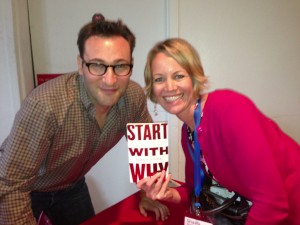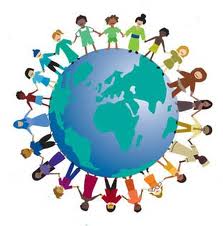This is a blog post I have been so looking forward to writing for the last two months! Women lean in every time I share pieces of this content around a dinner table, in a workshop on friendship, or at a mastermind group. It's not only crucial information for our lives, but it speaks so directly to the power of friendship that, even though I heard it first in a business context, I knew I had to share it with my blog community. Simon Sinek's Explanation of 4 Hormones You Need to Understand
In early May, I attended Rock the World 2013-- a women's business conference in NYC--where Simon Sinek was one of the keynote speakers. Simon is the author of Start with Why: How Great Leaders Inspire Everyone to Take Action
Sinek relied on human biology to illustrate what motivates behavior, saying basically that our actions boil down to the good feelings we get from four key chemicals in our body: dopamine, endorphins, oxytocin, and serotonin. When we trigger any of these chemicals in our bodies, we get a shot of something euphoric whether it's extra energy, joy, calm, or pride. Here's how we receive those good feelings:
- Dopamine is the result of accomplishing goals, it's designed to help us find what we're looking for. Every time we see a finish line, cross something off our to-do list, or see movement toward our goals-- we get that shot of dopamine!
- Endorphins mask our physical pain and help us keep pushing ourselves to where we need to be. For most of us who live more sedentary and safe lives, our most common form of endorphins come from exercise. If you've ever had a "runner's high"-- you know this feeling.
- Oxytocin is one I talk about a lot in connection with our friendships as it reinforces bonds, builds trust, and relieves stress. We get this from touch, meaningful conversation, breast-feeding, and when we see/experience acts of human generosity.
- Serotonin happens in moments of pride, recognition, and status. When we receive our diploma on stage, say "I do" in front of friends and family, or are the recipients of a meaningful award-- we get that shot of serotonin that boosts our joy.
Now, what I thought was super fascinating is that the first two chemicals you can get all by yourself. You need no one else present to get your dopamine from crossing something off your to-do list or to exercise and feel the endorphins. Sinek called these "selfish" hormones.
The latter two--oxytocin and serotonin-- are "unselfish" chemicals since we need someone else present in order to receive the rewards that our body wants to give us. He gave the example of someone who could just receive an email telling them that enough credits had been accomplished and the bill paid so therefore they earned their diploma-- and that person would have most certainly received a shot of dopamine for reaching their goal. But it's when that person dons their cap and gown and walks in front of everyone that the serotonin is released. We need an "audience"-- someone to cheer for us or witness our success-- to give us that sense of pride and recognition. And the best part of these unselfish chemicals? BOTH people get the shot. Not just the graduate on stage, but also the teachers who taught that student, the family that supported them, and their friends who did it with them. Oxytocin and serotonin need others present to initiate them, but they also benefit all parties.
Warning: We're Not Getting Enough...
He connected these four chemicals to how leaders and businesses can better understand how we're wired to help create more healthy workplaces; I heard the whole thing through the lens of friendship. While all four chemicals have their "addictive" qualities to them, Sinek warned that they are only dangerous when they are out of balance. And I agree with him that we live in a culture that is focusing way more on the selfish chemicals than the unselfish chemicals. We think it's easier to become workaholics to get more dopamine than it is to go hang out with friends to feel the oxytocin. (And how much more so when we don't yet have the close friends we find meaningful!)
Furthermore, two other chemicals-- testosterone and cortisol-- are INHIBITORS of oxytocin. In other words, when we feel stress or anxiety which results in cortisol shooting through our bodies, it prevents us from receiving the benefits of oxytocin which includes feelings of trust, safety, and empathy. We cannot build relationships of trust when we are in survival mode! That has far-reaching implications, to say the least. So the more stress you have in your life, the harder it is for you to experience the rewards of trust, generosity, love, and bonding with others. One short-circuits the other.
So here's my plea to the 22,000 women who subscribe to my blog-- please, please, please make sure you're intentionally adding oxytocin moments to your life! Make sure you're not on an unbalanced chemical loop where you just go after accomplishment and exercise to boost you. It's the selfless chemicals of oxytocin and serotonin that decrease your anxiety, turn your immune system on, facilitate feelings of trust, and basically make this world a better place where we can show generosity and love to one another!
I find it awesome that our bodies reward us to take care of each other!!! And who better to be shining givers and recipients of this than all of us who are committed to growing healthy and meaningful relationships in this world!
Virtual hugs!



